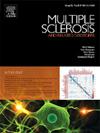Quality of life in patients with myelin oligodendrocyte glycoprotein antibody associated disease compared to patients with AQP4-IgG positive neuromyelitis optica spectrum disorders: A Korean multicenter study
IF 2.9
3区 医学
Q2 CLINICAL NEUROLOGY
引用次数: 0
Abstract
Background
Little is known about the quality of life (QOL) of patients with myelin oligodendrocyte glycoprotein antibody-associated disease (MOGAD). We compared QOL and associated factors in patients with MOGAD and aquaporin4 IgG (AQP4-IgG) positive neuromyelitis optica spectrum disorder (NMOSD).
Methods
This multicenter questionnaire study compared the QOL of 41 patients with MOGAD and 78 with AQP4-IgG positive NMOSD. Patients who were positive for AQP4-IgG or MOG antibodies were included. WHO Quality of Life Scale Brief Version was used to assess QOL in physical, psychological, social, and environmental domains. QOL, sleep quality, pain, fatigue, and depression were compared between the two groups. The factors associated with QOL in each group and the entire cohort were analyzed.
Results
The proportion of patients with poor QOL was not significantly different between MOGAD (51.22 %) and AQP4-IgG positive NMOSD (58.97 %, p = 0.054). In the MOGAD group, the pain score (β=-1.032, p = 0.001) and depression score (β=-0.694, p = 0.007) were negatively associated with physical and psychological QOL, respectively. Sleep quality was negatively associated with physical (β=-1.506, p = 0.034) and psychological (β =-2.064, p = 0.033) QOL. When the entire cohort was analyzed, a positive MOG antibody was independently associated with worse psychological QOL (β=-8.998, p = 0.013) compared to positive AQP4-Ab after adjustment for sleep quality, depression, fatigue, and pain.
Conclusions
The overall QOL of the patients of MOGAD was comparable to that of AQP4-IgG positive NMOSD. Patients with MOGAD were experiencing sleep disorder, fatigue, and depression at similar degrees to those of patients with AQP4-IgG positive NMOSD. Further consideration of sleep quality and psychological QOL is required to improve QOL in patients with MOGAD.
髓鞘少突胶质细胞糖蛋白抗体相关疾病患者与 AQP4-IgG 阳性神经脊髓炎视谱系障碍患者的生活质量比较:一项韩国多中心研究。
背景:人们对髓鞘少突胶质细胞糖蛋白抗体相关疾病(MOGAD)患者的生活质量(QOL)知之甚少。我们比较了MOGAD患者和aquaporin4 IgG(AQP4-IgG)阳性神经脊髓炎视谱系障碍(NMOSD)患者的QOL和相关因素:这项多中心问卷调查研究比较了41名MOGAD患者和78名AQP4-IgG阳性NMOSD患者的QOL。研究对象包括AQP4-IgG或MOG抗体阳性的患者。采用世界卫生组织生活质量量表简易版评估身体、心理、社会和环境领域的 QOL。两组患者的 QOL、睡眠质量、疼痛、疲劳和抑郁情况进行了比较。分析了与各组和整个组群的 QOL 相关的因素:MOGAD 组(51.22%)和 AQP4-IgG 阳性 NMOSD 组(58.97%,P = 0.054)的 QOL 差患者比例无明显差异。在 MOGAD 组中,疼痛评分(β=-1.032,p = 0.001)和抑郁评分(β=-0.694,p = 0.007)分别与身体和心理 QOL 负相关。睡眠质量与身体(β=-1.506,p=0.034)和心理(β=-2.064,p=0.033)QOL呈负相关。在对整个队列进行分析时,在对睡眠质量、抑郁、疲劳和疼痛进行调整后,MOG抗体阳性与AQP4-Ab阳性相比,与心理QOL较差独立相关(β=-8.998,p=0.013):结论:MOGAD 患者的总体 QOL 与 AQP4-IgG 阳性的 NMOSD 患者相当。MOGAD患者的睡眠障碍、疲劳和抑郁程度与AQP4-IgG阳性NMOSD患者相似。需要进一步考虑睡眠质量和心理QOL,以改善MOGAD患者的QOL。
本文章由计算机程序翻译,如有差异,请以英文原文为准。
求助全文
约1分钟内获得全文
求助全文
来源期刊

Multiple sclerosis and related disorders
CLINICAL NEUROLOGY-
CiteScore
5.80
自引率
20.00%
发文量
814
审稿时长
66 days
期刊介绍:
Multiple Sclerosis is an area of ever expanding research and escalating publications. Multiple Sclerosis and Related Disorders is a wide ranging international journal supported by key researchers from all neuroscience domains that focus on MS and associated disease of the central nervous system. The primary aim of this new journal is the rapid publication of high quality original research in the field. Important secondary aims will be timely updates and editorials on important scientific and clinical care advances, controversies in the field, and invited opinion articles from current thought leaders on topical issues. One section of the journal will focus on teaching, written to enhance the practice of community and academic neurologists involved in the care of MS patients. Summaries of key articles written for a lay audience will be provided as an on-line resource.
A team of four chief editors is supported by leading section editors who will commission and appraise original and review articles concerning: clinical neurology, neuroimaging, neuropathology, neuroepidemiology, therapeutics, genetics / transcriptomics, experimental models, neuroimmunology, biomarkers, neuropsychology, neurorehabilitation, measurement scales, teaching, neuroethics and lay communication.
 求助内容:
求助内容: 应助结果提醒方式:
应助结果提醒方式:


